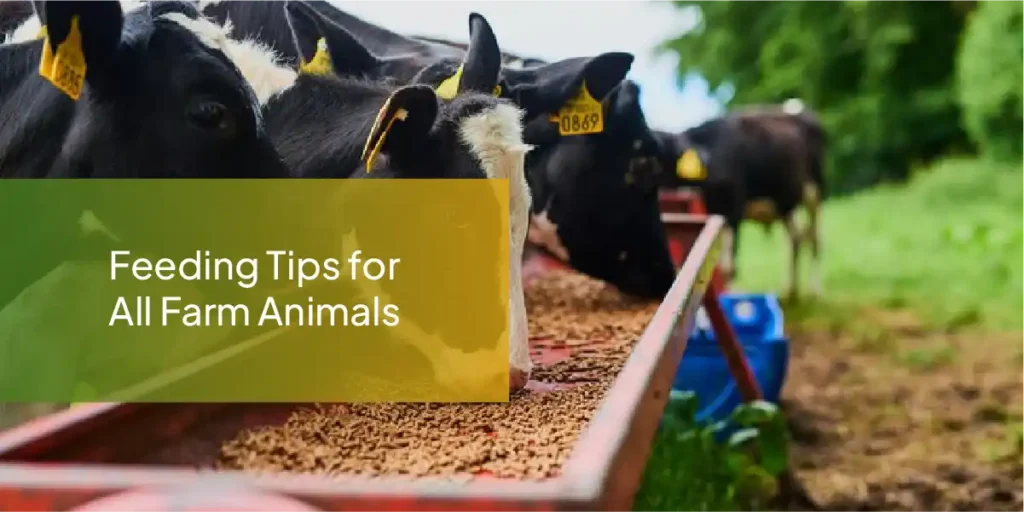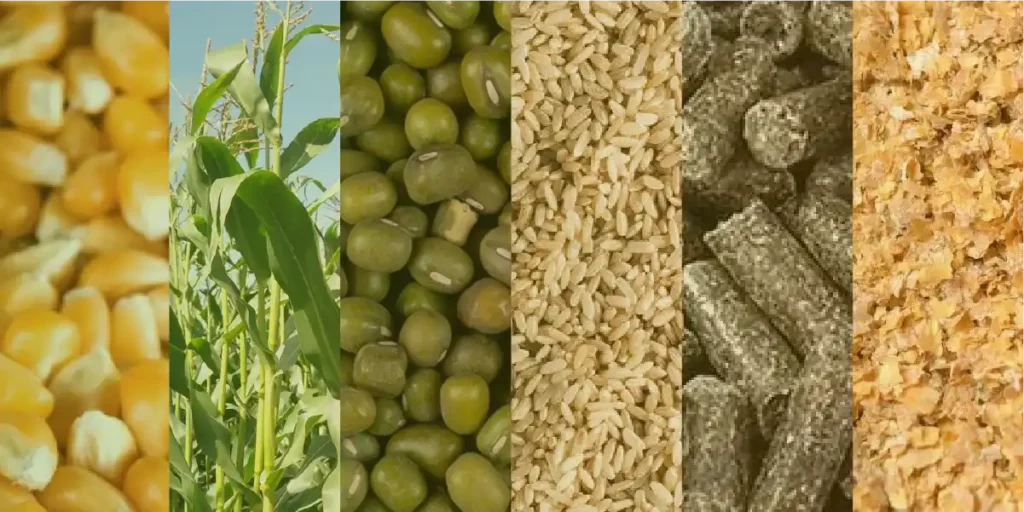Feeding farm animals properly is essential to their health, productivity, and overall well-being. Each species has unique dietary requirements that support growth, reproduction, and the production of quality meat, milk, eggs, or wool. Understanding these needs and providing the right feed is critical for ensuring animals thrive and farm operations remain sustainable.
Farm animals require a balance of energy, protein, vitamins, minerals, and fiber in their diets. Providing the right feed improves their health, boosts immunity, enhances productivity, and reduces the risk of diseases. Moreover, well-fed animals deliver better quality products, which directly impacts the profitability of farming.
In this blog, we will explore the best feed options for different farm animals and explain why certain feeds are ideal for specific species.
1. Feed Options for Cows
Cows are one of the most important animals on a farm, providing milk, meat, and sometimes labor. Their diet needs to support their energy requirements, digestive health, and productive capacity. A balanced diet ensures healthy growth, high milk yield, and good-quality meat.
- Forage: High-quality forage like grass, hay, and silage is essential for providing the fiber needed for proper digestion and energy. Silage is particularly beneficial due to its high moisture content and palatability.
- Energy-Rich Grains: Grains such as maize and barley supply the carbohydrates necessary for energy and milk production in dairy cows and weight gain in beef cattle.
- Protein Supplements: Protein-rich feeds like sunflower meal or soybean meal help support muscle development, reproduction, and milk yield.
- Fiber and Byproducts: Wheat bran and other fibrous byproducts are excellent for enhancing digestion and maintaining gut health.
- Mineral and Vitamin Supplements: Providing access to mineral blocks ensures cows receive essential nutrients like calcium and phosphorus, critical for bone strength and overall health.
Pro Tip: Ensure a gradual transition when changing feeds to prevent digestive disturbances.
2. Feed Options for Chickens
Chickens are versatile farm animals raised for their eggs and meat. Their feed should be tailored to their specific purpose, ensuring they remain healthy and productive. Good feed not only supports their growth but also enhances the quality of eggs and meat.
- Layers: Layer mash or pellets fortified with calcium is ideal for egg production. The calcium ensures strong eggshells, while balanced nutrients improve overall productivity.
- Broilers: Protein-rich starter and grower feeds support rapid growth and healthy meat production. Grain-based feeds like maize provide the energy necessary for broilers’ development.
- Kitchen Scraps and Grit: Small amounts of leafy greens and fruit can supplement their diet. Grit is necessary to aid digestion as chickens lack teeth.
Pro Tip: Maintain a steady supply of clean water to support digestion and egg production.
3. Feed Options for Goats
Goats are hardy animals that can adapt to various environments, but they still require a carefully balanced diet to thrive. Their feed should promote healthy growth, reproduction, and milk production.
- Browse and Forage: Shrubs, tree leaves, and high-quality hay are staples for goats, providing essential nutrients and roughage.
- Grains: Small quantities of grains like millet or maize are excellent energy sources, especially for lactating or growing goats.
- Protein Sources: Protein-rich supplements like sunflower meal improve growth rates and milk production.
- Minerals: Goats require access to mineral blocks or loose minerals, particularly those containing copper and selenium, to prevent deficiencies.
Pro Tip: Avoid overfeeding grains, as goats are prone to digestive upset and bloating.
4. Feed Options for Pigs
Pigs are efficient converters of feed into meat, making their diet a crucial factor in farming success. A balanced feed supports rapid growth, reproductive health, and high-quality meat production.
- Grains: Maize, barley, and millet are excellent for providing carbohydrates essential for energy.
- Protein Sources: Feeds such as sunflower meal or soybean meal provide the amino acids needed for muscle growth.
- Fiber and Byproducts: Rice bran and wheat bran improve digestion and add bulk to their diet.
- Fresh Produce: Small amounts of fruits and vegetables can be included for variety and additional vitamins.
Pro Tip: Avoid feeding pigs salty, sugary, or spoiled foods to prevent health issues.
5. Feed Options for Sheep
Sheep are primarily raised for wool, meat, and milk, and their diet must cater to these production goals. Providing a fiber-rich diet helps maintain their digestive health and supports optimal productivity.
- Forage and Pasture: Grass, hay, and silage are excellent sources of roughage. Silage is particularly valuable for maintaining condition during dry seasons.
- Grains: Small amounts of maize or barley provide energy, especially for pregnant or lactating ewes.
- Protein Sources: Feeds like sunflower meal support wool growth and reproduction.
- Minerals: Provide salt licks and mineral supplements, particularly those containing selenium and iodine, to prevent deficiencies.
Pro Tip: Ensure constant access to clean water, as dehydration can lead to health issues.
6. Feed Options for Horses
Horses require a diet that balances energy and fiber to maintain their health and performance. Their feeding regimen must align with their workload, whether they are used for work, sport, or leisure.
- Forage: Hay and grass form the foundation of a horse’s diet, supplying the fiber necessary for digestion.
- Grains: Maize or oats are excellent for providing energy, particularly for working or performance horses.
- Byproducts: Wheat bran can be added to their diet for its palatability and digestive benefits.
- Fresh Produce: Small amounts of fruits and vegetables, such as carrots and apples, can serve as healthy treats.
Pro Tip: Feed horses smaller, more frequent meals to avoid digestive issues like colic.
General Feeding Tips for All Farm Animals

- Consistency Is Key: Feed animals at the same times daily to establish a routine and support their digestive systems.
- Clean Feeding Areas: Prevent contamination by regularly cleaning feed and water containers.
- Hydration Matters: Always provide access to fresh, clean water to ensure proper digestion and health.
- Monitor Health: Observe animals for signs of overfeeding, underfeeding, or nutrient deficiencies.
Conclusion
Providing the right feed for farm animals is a cornerstone of successful farming. A balanced diet tailored to each species’ needs improves health, productivity, and overall farm efficiency. By understanding the benefits of forage, grains, protein sources, and supplements, you can ensure your animals thrive and contribute to a prosperous farm operation.
For more insights and tips on animal nutrition, explore our blog regularly. Happy farming!


